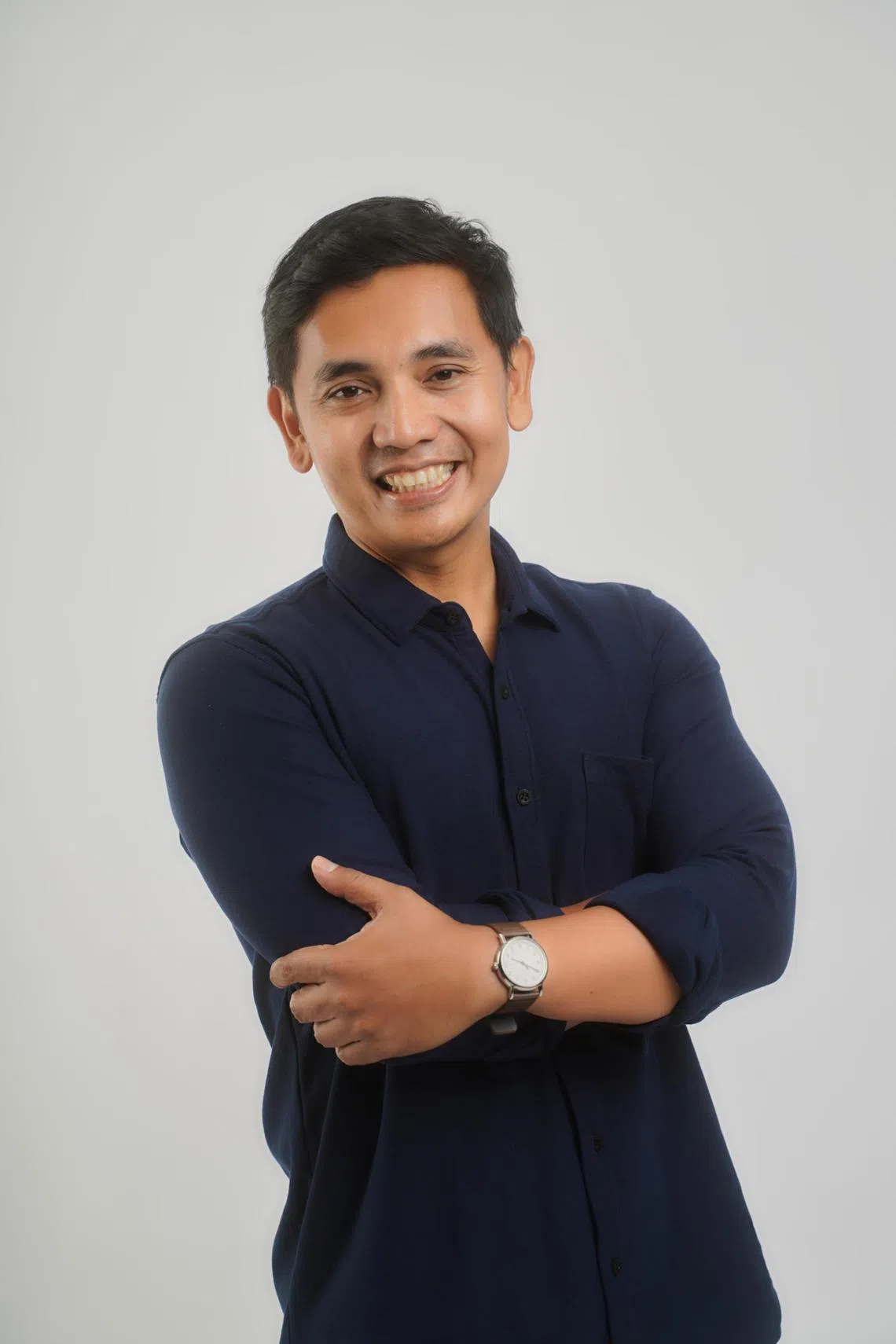ST Education Forum 2025
Charting a new course: How Indonesia’s untapped opportunities are poised for growth
In this second of a four-part series on South-east Asia and our shared future, Indonesian entrepreneur and education adviser Aldi Haryopratomo talks to Hariz Baharudin about how telling stories can empower underserved communities and why Indonesia stands out as a prime destination for students eager to unlock transformative opportunities.
Sign up now: Get ST's newsletters delivered to your inbox

Indonesian entrepreneur and education adviser Aldi Haryopratomo also talks about why Indonesia stands out as a prime destination for students eager to unlock transformative opportunities.
PHOTO: REUTERS
JAKARTA – Digital payments, telemedicine, education and movies – with such an extensive resume, it is hard to believe that prominent Indonesian entrepreneur and education adviser Aldi Haryopratomo is only 42.
Mr Aldi, a father of three, is best known as the founder and former chief executive of GoPay, a leading digital wallet in Indonesia, which has played a key part in driving the adoption of QR code payments, and facilitating the use of digital payments in areas where they were not widespread.
He has also contributed to Indonesia’s healthcare sector. As a member of the board of Halodoc, a health-tech platform, he has worked on improving healthcare accessibility and promoting sustainable practices within the industry.
In addition, Mr Aldi has a strong interest in storytelling, particularly in film and media. He also sits on the board of Visinema, an Indonesian award-winning film studio.
He views storytelling as a means of simplifying complex concepts and engaging a broader audience in all realms, including business and technology. This approach is clear in his work, from using creative campaigns to introduce QR code payments to advocating for the use of telemedicine in underserved areas.
Mr Aldi spoke to The Straits Times in January to discuss the role of storytelling in technology adoption, the importance of creating products that meet real needs, and offered some words of wisdom to budding entrepreneurs in South-east Asia.
Q: Policies must be communicated well to the people they are supposed to serve to achieve desired outcomes. Why is it important to use storytelling devices as a way to inform people, especially people in underserved communities or in rural areas, who might not be the most aware of the importance of, say, financial planning or preventative healthcare?
A: Communicating via stories has been impactful for ages, sometimes even more so than highlighting data, especially for those who aren’t interested in statistics. This is why media like mainstream movies can shape the zeitgeist of a country or culture.
Movies and YouTube can simplify and promote acceptance of new technologies. For example, before QR codes were widely adopted for payment, we created a fictional YouTube skit demonstrating how QRs could be used. It was a sitcom-like scenario based on The Office.
The setting was Blok M, where we used QRs to pay at hawker centres, convenience stores, even toilet stalls. Because it was fiction, we were able to explore what was not yet allowed by regulations, and we could show what the vision of the world could look like.
(But) for the change to be adopted nationwide... ultimately, the regulators will need to be the main driver with the private sector supporting them.
Similarly, in healthcare, we could tell a story about how telemedicine can not only make healthcare more accessible to remote parts of Indonesia, but also more affordable in cities. A story that is well told can shift the perception of something from being a novelty to something that is impactful and widely adopted.
Q: You have highlighted storytelling as a powerful tool for communicating messages and influencing behaviour in Indonesia. Is this something global businesses looking to enter and succeed in the Indonesian market should prioritise? How can they effectively leverage storytelling to ensure their messaging resonates with the local audience?
A: Absolutely. I’ve seen businesses enter with more of a short-term discount or spending a lot on advertisements. But those that take the time to embed themselves in the local zeitgeist and be part of stories that resonate with an Indonesian audience would find these investments worthwhile.
One proven way brands have been embedding themselves in global stories for decades is by having products be associated with a movie. For example: Aston Martin and James Bond. Ray-Ban and Top Gun. Mini Cooper and The Italian Job.
Q: Given your extensive business experience, what makes Indonesia attractive for entrepreneurs? What unique opportunities can its bustling cities and large population offer, and how should Asean entrepreneurs navigate its market?
A: Different entrepreneurs have different reasons for why Indonesia is an attractive destination to expand in. But regardless of the sector, my recommendation is to find a local partner that has the bandwidth to help the overseas brand grow.
Those that target consumers find our sizeable middle-class, young and urban population attractive. Those that are in energy see the potential for untapped renewables such as hydro and geothermal power. Those in minerals may want to be part of our nickel boom. Those that are seeking to avoid the United States’ tariffs might see us as attractive because Indonesia’s trade balance with the US is far down the potential tariff list.
But Indonesia also comes with a host of challenges. The World Bank scores the business (regulatory framework) that affects businesses’ operational efficiency at 61.31, which is lower than Singapore’s (87.33) and Vietnam’s (72.78). Tangible examples of barriers are getting certifications, managing local workforce laws, tax management, etc.
So my recommendation for anyone wanting to expand to Indonesia is to find a local partner that shares their vision and has enough bandwidth to prioritise their brand. The typical route I see for an overseas brand is to find a large company, sometimes public, to be the partner because these large companies already have 10 to 30 foreign brands under their belt.
Q: What are some words that you can share with budding entrepreneurs who dream one day about starting their own business but are a bit held back by the uncertainty in the global situation and external environment?
A: Definitely, today’s times are uncertain, there are a lot more wars. But frankly, you can point to almost any moment in history, and somebody would say that it’s a very uncertain time, right? If you go back to the 90s, there was a Gulf War. There’s always something... but change is the only constant.
Even though it’s uncertain, my advice would be that it’s always a great time to build a company. There’s never a bad time. Actually, my next advice would be, funnily enough, don’t build a company so quickly. The mistake that I see is that people build something for the sake of being an entrepreneur, versus having this real problem that they’re itching to solve that matters deeply to them.
If you can’t find someone doing what you are doing, and you are sure you have a unique perspective that no other company is pursuing, then you should go for it. You don’t want the world’s smartest minds to be just copying each other.
Q: How crucial is education for Asean’s young population to become globally agile, fostering curiosity and cross-cultural engagement? Should Indonesia be a destination for regional student exchange programmes and internships, and why?
A: Educational experiences that allow the young population to work together with other cultures, or experience living in another culture, are extremely useful to make our talent globally agile. Student exchange programmes, student competitions or even general collaborations across borders of educational institutions exist and should be encouraged. There’s no better way for students to learn about other cultures than immersing themselves directly.
Students should consider coming for an exchange in Indonesia because in addition to culture, there are a lot of opportunities to have fun. We have world-class beaches, mountains and nature, as well as historical cultural gems like Borobudur.
Also, our language is extremely easy to learn as it was designed to be easy. Phonetic pronunciation, no tenses, will enable anyone interested in learning to learn fast.
About Aldi Haryopratomo

Mr Aldi Haryopratomo is an entrepreneur and investor advancing Indonesia’s healthcare and creative sectors.
PHOTO: ST
Mr Aldi Haryopratomo is an entrepreneur and investor advancing Indonesia’s healthcare and creative sectors. He sits on the boards of Halodoc and Visinema.
With over 15 years of experience, his career began at Kiva.org before he became CEO of GoPay, where he pioneered QR payments and pay-later services.
Transitioning from fintech, Mr Aldi now champions Indonesia’s creative and healthcare industries. Through Halodoc, he builds a streamlined healthcare ecosystem. He also invests in ventures from films to artisanal coffee.
Mr Aldi holds an MBA from Harvard Business School and a degree in Computer Engineering from Purdue University. He also mentors on SMU’s International Advisory Council.
What: The Straits Times Education Forum 2025, in partnership with Singapore Management University
Topic: South-east Asia And Our Shared Future
Where: Yong Pung How School of Law, Basement 1 SMU Hall, Singapore Management University
When: Tuesday, March 11, 2.15pm to 5.30pm (GMT+8.0)

The Straits Times



